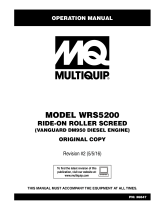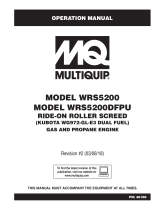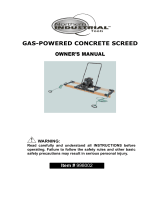
Safety Information P 35A
8 wc_si000232gb.fm
1.2 Machine Description and Intended Use
This machine is a vibratory concrete screed. The Wacker Neuson Wet
Screed consists of a gasoline engine, a fuel tank, and a metal blade,
an eccentric weight positioned at the center of the metal blade, and a
control handle. The gasoline engine spins the eccentric weight
through a drive shaft, producing vibrations that travel the length of the
metal blade. The operator uses the control handle to pull the machine
across uncured concrete.
This machine is intended to be used for striking off uncured concrete
slabs with or without the support of grade stakes or forms.
This machine has been designed and built strictly for the intended use
described above. Using the machine for any other purpose could
permanently damage the machine or seriously injure the operator or
other persons in the area. Machine damage caused by misuse is not
covered under warranty.
The following are some examples of misuse:
• Using the machine as a ladder, support, or work surface
• Using the machine to carry or transport passengers or equipment
• Engaging the screed when not on uncured concrete
• Operating the machine on non-compactable surfaces, such as
asphalt or cured concrete
• Operating the machine outside of factory specifications
• Operating the machine in a manner inconsistent with all warnings
found on the machine and in the Operator’s Manual
This machine has been designed and built in accordance with the
latest global safety standards. It has been carefully engineered to
eliminate hazards as far as practicable and to increase operator
safety through protective guards and labeling. However, some risks
may remain even after protective measures have been taken. They
are called residual risks. On this machine, they may include exposure
to:
• Heat, noise, exhaust, and carbon monoxide from the engine
• Chemical burns from the curing concrete
• Fire hazards from improper refueling techniques
• Fuel and its fumes, fuel spillage from improper lifting technique
• Personal injury from improper lifting techniques or operating
techniques
• Excessive vibration by holding the blade
To protect yourself and others, make sure you thoroughly read and
understand the safety information presented in this manual before
operating the machine.






















